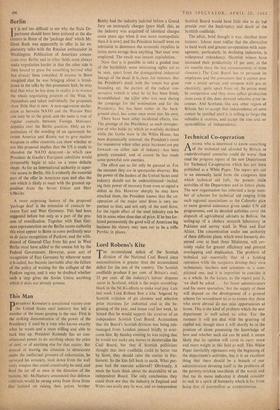Technical Co-operation
A NYONE who is interested to know something of the technical aid afforded by Britain to underdeveloped countries could do worse than read the progress report of the new Department for Technical Co-operation which has just been published as a White Paper. The report sets out in an unusually lucid form the categories into which technical aid falls, the present main activities of the Department and its future plans. The new organisation has inherited a large num- ber of schemes for technical aid ranging froM such regional associations as the Colombo plan to more general assistance given under UN aid programmes, and its detailed activities cover the diSpateh of agricultural advisers to Bolivia, the setting4ip of a cholera research laboratory in Pakistan and survey work in West and East Africa. The concentration under one authority of these different plans, which were formerly persed over at least three Ministries, will cer- tainly make for greater efficiency and prevent overlapping and duplication. The problem of technical aid—essentially that of a holding operation while the recipients develop their own technicians, teachers and scientists—is a com- plicated one, and it is important to consider it as a whole. In the future, as the report puts it, 'we shall be asked . . . for fewer administrators and for more specialists,' but the supply of these will depend on the development of a general scheme for secondment so as to ensure that those who serve abroad do not miss opportunities at home. This is the kind of' problem which the new department is well suited to solve. For the moment it will not deal with the granting of capital aid, though since it will shortly be in the position of alone possessing the knowledge of how and whether such aid can be used, it seems likely that its opinion will come to carry more and more weight in this field as well. This White Paper inevitably represents only the beginning of the department's activities, but it is an excellent thing that there should be a branch of our administration devoting itself to the problems of the poverty-stricken two-thirds of the world and that (as its name indicates) it should consider its task in a spirit of humanity which is far from being that of paternalism or condescension.


































 Previous page
Previous page